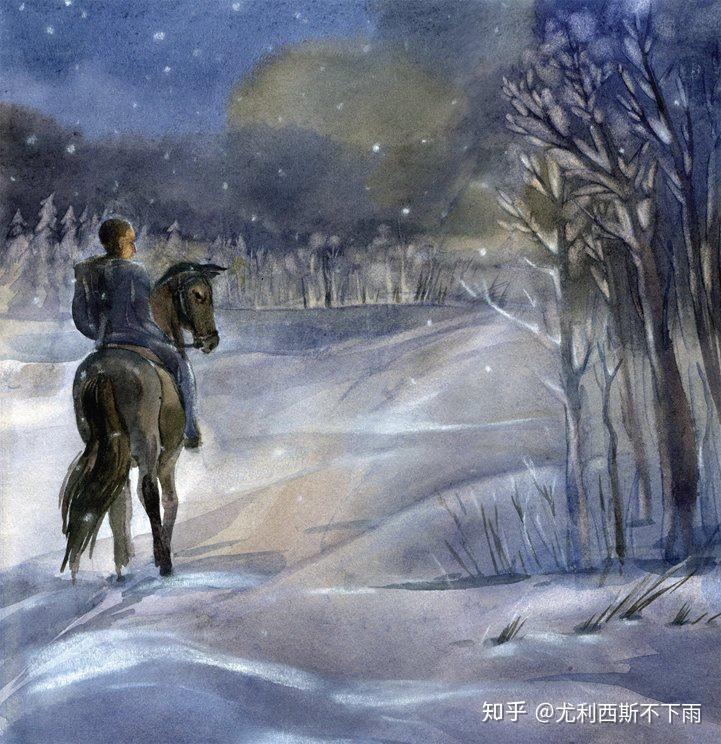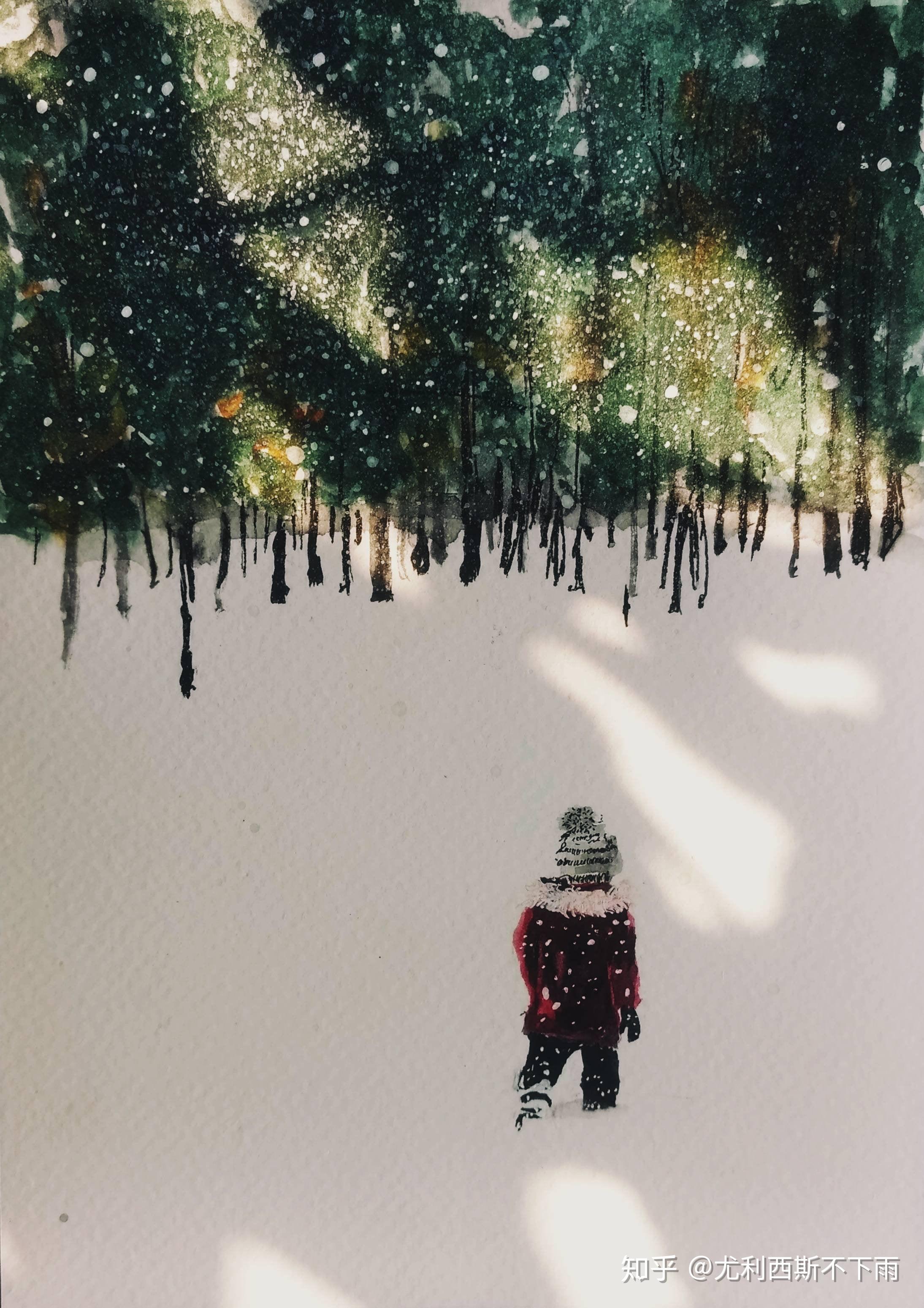StoppingbyWoodsonaSnowyEveningRobertFrost罗伯特·弗罗斯特(RobertFr...




Stopping by Woodson aSnowy Evening
Robert Frost
罗伯特·弗罗斯特(Robert Frost,1874—1963),美国意象派时期的著名诗人。他出生于旧金山一个教师家庭,1l岁时父亲去世,由母亲抚养成人。弗罗斯特从小就喜爱读诗写诗,中学时代就显露诗才。1892年,他的祖父将他送进达第斯学院学习,但弗罗斯特感到学校生活索然无味,7个星期后退了学,从此。开始了一边工作一边写诗的生活。这期间他游历过美国南部,当过教员,做过编辑工作等。1894年他首次发表名为“我的蝴蝶”(My Butterfly)的诗作。1897年弗罗斯特进入哈佛大学学习,但两年后因肺病中途辍学。
弗罗斯特曾四次获普利策诗歌奖,还曾应肯尼迪总统之邀在其就职仪式上朗诵自己的诗歌。他还是美国未受封的“桂冠诗人”。他一生写了大量的诗篇,他的诗作语言简单、朴素。但这些简单、朴素的语言却具有欺骗性.它们往往具有深刻的含义,令读者不得不去咀嚼、玩味。
Stopping by Woods on a Snowy Evening
Whose woods these are I think I know.
His house is in the village though;
He will not see me stopping here
To watch his woods fill up with snow.
My little horse must think it queer
To stop without a farmhouse near
Between the woods and frozen lake
The darkest evening of the year.
He gives his harness bells a shake
To ask if there is some mistake.
The only other sound’s the sweep
Of easy wind and downy flake.
The woods are lovely, dark and deep,
But I have promises to keep,
And miles to go before I sleep,
And miles to go before I sleep.


写作背景
《雪夜林边小驻》是弗罗斯特最著名的诗篇之一,写于1922年的冬季,当时他正在佛蒙特州沙夫茨伯里的家里(现为罗伯特·弗罗斯特纪念馆)撰写最著名的诗集之一《新罕布什尔》。他完成这篇长诗时已将近早上,他走出房门观赏日出,突然灵感一现,在几分钟之内顺利写下了新诗“about the snowy evening and the little horse as if I’d had a hallucination”
这首诗于1923年首次刊登在弗罗斯特的《新罕布什尔》诗集里。作者本人非常喜欢这首诗,在1923年写给Louis Untermeyer的信里曾称之为“我最值得回忆的”的诗。
弗罗斯特一生大都闲居乡里,远离尘嚣。他的诗作多以美国新英格兰乡村为背景,具有浓郁的乡土气息和诱人的田园情趣。它的诗犹如一幅幅令人心旷神怡的田园诗画,令人流连忘返。
《雪夜林边驻马》就是这样一首诗歌。它不仅是弗罗斯特的代表作,也是英语中的抒情诗代表作.同时也是美国诗人所写的最出名的一首诗歌。在这首诗中.读者通过诗人简单的语言不仅能看到一幅优美的画.同时还能欣赏到悦耳、耐人寻味的歌。


意象
诗人在《雪夜林边小驻》中选取的意象组合:雪夜,森林,冰湖,小马,承诺和入睡简单明了,但英语诗词中的视觉诗“用书写形式上的视觉形象来辅助诗意的传达”,131使看似简单明了的意象具有了无穷的深意,再运用中国意境理论形神兼备、借物传神的特点对诗歌中所选取的物象进行分析。在视觉意象(visual image)上:漫天飞舞的雪花和冰冻的湖水意味着刺骨的寒冷和寂寥冷清,放在这个特意选取的雪夜,则更是加深了其幽暗和不确定性;森林代表着宁静、可爱和深邃;而小马的局促不安和对主人在如此寒冷、孤寂的夜晚驻足在林边的目的性的疑问,则在另一个侧而和诗人此时的心境产生了现实温暖的感情联系,似乎只有它还在关心此时的主人;再结合听觉意象(auditory image),小马的铃铛声和狂风劲吹雪花飞舞的声音更是在视觉意象的基础上深化了此时的宁静,从而更显得本已经寒冷、寂寥的诗人此时更加的孤寂、无奈和无依无靠。
对另一组意象Promise和Sleep进行分析。在本首诗歌欣赏的表面,Promise肯定是诗人所要坚守的承诺,表面意义上并没有对承诺的内容做特别的说明,只是说还有要坚守的承诺(But I have promises to keep),结合意象Sleep的所指,终于能使读者突破对于Sleep意象在诗歌中的简单理解:Sleep仅指诗人冒雪前行、历经艰辛所要到达的一个处所,一个可以安静休息的地方,而上升至诗歌中的Sleep并不是指途中投宿,而是生命终止的委婉式表达。因此,前文所述的Promise就可以理解为诗人的信念和未尽之志,以及对于自己突破潮流影响始终坚持自己描述和创作以新英格兰地区乡村生活为主题的诗歌道路的自我坚守和不放弃,对于乐于清贫的生活方式的自我肯定。对意象Promise和Sleep进行组合分析,再联系前面所述的意象特征,终于明白:诗人以一句But I have promises to keep,And miles to go before I sleep结束了前文物境描写的彷徨、内心的斗争和踌躇不前,产生了坚守自我认同、勇于接受挑战、勇于承担人生责任的激情和信心,也最终回答了诗人驻足林边的不惑,点出了本首诗歌真正的哲学主题和生活意蕴,从而从本质上使之与一般性的田园诗区分开来,有了质的升华和飞跃,成为作者生平境遇的悲情和乡村题材诗歌创作的艰辛的真实写照。
因此,如果仅仅是在该首诗歌所要描摹的意象上分析诗人此时的心境,那必然是狭隘和矮化了作者的用意了。在意境理论的视角下,该首诗歌不仅真实地刻画了作者不幸的童年生活,将作品放在当时的社会和文化背景下,更在另一个角度展现了作者创作诗歌过程中的艰难和心理情感上的孤独感。因为罗伯特诗歌以乡村生活为主的创作主题,和他独特的写作方法以及选择的对古罗马诗人威吉尔(Vergil,70—19BC)开创的田园诗歌创作传统的遵循和发展,在当时的美国文学界有着极大的现实困惑。20世纪上半叶的美国现代文学流派异彩纷呈,各种思潮交相辉映。意象派如风披靡,旋涡派盛极一时,芝加哥派甚嚣尘上,女性独自主义热潮一浪高一浪。而弗罗斯特的诗歌创作一开始就选择了一条与绝大多数同时代诗人迥然不同的道路,从而决定了诗人坚持自我创作道路的异常艰辛和心理体验上的孤独感。再结合前文对于该首诗歌中的意象分析,与其说诗人以一句But I have promises to keep.And miles to go before I sleep结束了驻足林边的无奈、彷徨,还不如说是作者结束了对自己选择的生活方式和诗歌创作道路的自我疑问,对于自己坚守的人生信条的激情和自我肯定。生命犹如雪夜的森林可望而不可知,有其本身的神秘性,但对于生命的意义应该是坚守信念、义务和责任继续前行去完成未尽之志,而不是无所事事,虚度时13,并流连于沿途的美景而踌躇不前,无为而终。该首诗歌另一个艺术特点是对于意象Promise和Sleep的所指诗人并没有在诗歌中作明确的交代,而是需要读者去联系前文挖掘、探究,也在这个意义上宽泛和放大了承诺的具体所指,使之从生活、创作的具体层面上升到了生命的主题,从而为不同生活经验和不同审美层次的读者预留了充足的审美空间来自我思考、自我比对直至联系作者生平和创作特点并最终明白该首诗歌的真正主题,才进而由外在的直观意象感受深入到自我理性情感世界,产生联想、引起共鸣,在对诗歌的理解上将诗人描写的意象联系起来,辅以自我情感,终于水到渠成地将诗歌中的景致描述和诗人的情感审美体验、作品主题有机结合了起来,景中寄情,心为物役,产生了情景交融的艺术和审美效果,将读者的自我感受和作品联系起来,深入其中,韵味无穷,这便是该首诗歌的意境美。
意境视角下的《雪夜林边小驻》便是这样的一件艺术品,罗伯特·弗罗斯特在尊重和传承传统诗歌的形式的基础上,以细致入微的观察,异常敏锐的灵感,清新鲜润的笔调,将雪夜林边看似简单的意象描摹和厚重的生活哲理、生命意义、人生信条和责任义务等主题有机统一起来,凸显了对人生理想的坚守和对生命价值的追求,并充满低调的激情和信心始终坚守!产生了情景交融的艺术效果和审美体验,让人沉思、发人深省。


Hesitation and Choice
Throughout the poem, the speaker seems to be stuck in a space in between society’s obligations and nature’s offer of solitude and reflection. Though the speaker reflects on the possibilities offered by each, he or she is ultimately never able to choose between them. In fact, the speaker’s literal and figurative placement seems to suggest that choice itself might not even be possible, because societal rules and expectations restrict the speaker's free will. In other words, beyond exploring the competing pulls of responsibility and personal desire on the speaker, the poem also considers the nature—or mere possibility—of choice itself.
The speaker starts and ends the poem in a state of hesitation. In the first line, the speaker says, “Whose woods these are I think I know,” a statement which wavers between a sure declaration (“I know”) and doubt (“I think”). This may suggest that the central conflict of the poem will be the speaker’s battle with uncertainty. The physical setting of the poem, in which a speaker stops partway through a journey, mirrors this irresolution, finding the speaker neither at a destination nor a point of departure but rather somewhere in between.
The speaker also notably pauses “between the woods and frozen lake”—literally between two landmarks. On top of that, the speaker has stopped on the “darkest evening of the year.” If we understand this to mean the Winter Solstice, then the poem also occurs directly between two seasons, autumn and winter. Thus, the speaker is physically poised on the brink between a number of options, suggesting the possibility of choice between physical worlds, and, later in the poem, between duty to others and a personal wish to rest in solitude.
However, it's unclear in the end if the speaker chooses to fulfill his or her "promises" or merely accepts the obligation to do so as an incontrovertible fact of life; that is, whether he or she actively makes a choice to continue or accepts that there is no choice at all. Though the speaker seems to indicate in the end that he or she will continue on and keep his or her promises, this doesn’t seem to be a straightforward decision. In fact, it may not be a decision at all, but rather an embittered consent to the rules of societal life. The speaker may very well wish to stay in the “lovely” woods, but is ultimately unable to do so.
However, we can also read the final stanza as demonstrating that the speaker hasn't left the woods yet. Although he or she has obligations, there are “miles to go,” and the dreamy repetition of the final lines could suggest that there are either too many miles left to travel, or even that the speaker is slipping into sleep—effectively refusing to make a choice (or implicitly choosing to stay, depending on your interpretation).
Thus, it is possible to read the entire poem as embodying a moment of hesitation, wavering between two poles but never leaning toward one or the other. This would further complicate the outcome of the poem, resisting a definitive reading and suggesting that the tensions between society and nature, and between obligation and individualism, are never black-and-white, but constantly in a murky state of flux.
也 许 你 还 喜 欢
译典 | 我心匪石,不可转也。
e.e.卡明斯:进步是一场令人舒服的疾病
英文诗选赏析 | In a Station of the Metro












如果认为本文对您有所帮助请赞助本站